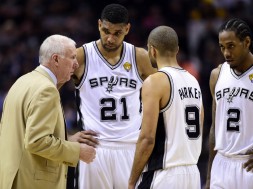Most people believe that the “Moneyball” theory cannot work in the NBA because of the high maintenance of stars, individual talent and sometimes lack of a team concept. However, what professional sports prove time and time again is that sometimes reasons for team successes are overlooked. The “Moneyball” theory is a term conceptualized by Oakland A’s general manager Billy Beane which uses evidence-based research and sabremetrics to create a competitive team.
Now in the NBA, constructing a team with players with high field goal percentages may work to put points on the scoreboard but it players may lack skill on the defensive end. Conversely, constructing a team comprised with players who may excel in defense, but lack the offensive firepower. In other words, there has to be good mix of offense, defense and teamwork. These statements should not be anything new to anyone who wants to construct a competitive team but the one word I forgot to mention is “consistency.” The Moneyball theory focuses on objective results but it also preaches consistency and there is no other team in the NBA that has been more consistent than the San Antonio Spurs over the last thirteen years. The Spurs have amassed consecutive fifty-win seasons and 4 NBA titles but what’s the formula for their success?
After the 1996-97, the team enjoyed regular season success but decided to change the team’s coaching philosophy from Bob Hill to Greg Popovich. Popovich had been in the front office as a general manager and saw that while the team was competitive, they lacked intensity and toughness. Throughout the league, Bob Hill’s coaching style was known as rigid and detail oriented similar to a dictatorship but Popovich believed the team approach should be more democratic and hold players accountable for their actions. In a cooperative environment, players are to learn a system which maximizes the skills of each player and not just the win-lost record of the team. At the 1997 draft, the Spurs drafted Tim Duncan, an All-American center from Wake Forest from Wake Forest to team with David Robinson. The drafting of Duncan was very significant because it started the team’s approach for years to come. Has anyone ever noticed that the San Antonio Spurs seem to always have a collection of the same type of players in their system? Penetrating point guards who can knock down an open jump shot, shooting guards who are able to create their own shots, versatile small forwards who can defend guards but also possess a high career three point percentage, flexible power forwards who can defend in the post but also stretch the defense out on the perimeter and finally a center who can defend and score in the post. In addition, duplicate three to five similar players that come of the bench. This formula was not created by accident; in fact this strategy is why the Spurs are so consistent. From Avery Johnson to tony Parker, Mario Elie to Manu Ginobli, Jerome Kersey to Robert Horry, David Robinson to Tim Duncan as well as other players, the Spurs have always focused on being built to last. For any team in the NBA, it would be easy to acquire the best free agent in the market during the offseason but it is also apparent around the league that every time star players come to a new team, the philosophy more than likely will change. Coach Popovich believes that, “if is not broke, don’t fix it!” which is a simple phrase used for a complex system. Also, if you think Greg Popovich just became an overnight success who got lucky with his own strategy, you would be inclined to know that he is a graduate of the Air Force Academy with a degree in Soviet studies and almost pursued a career in counterintelligence.
In addition to analyzing the general makeup of Spurs team, you also have to look at statistics like the average player age and player development which both concepts tie in to the Moneyball theory. Historically, every NBA championship team since 1999 has had an average player age of less than 29 years old except for the 1999 and 2007 NBA champion Spurs. To clarify, the 1999 Spurs played in 50 game lockout- shortened season however they were thought to be very experienced team who eventually finished 37-13 and lost only two games in the playoffs. The 2007 Spurs were also experienced but battle tested and went on to sweep the finals, four games to zero. Both teams average player age was 30 but why is age so significant? Most NBA analysts believe that age and experience are important factors on a championship team but players can also break down physically during a playoff run. Moreover, younger and more athletic teams can sometimes overcome lack of experience with high intensity. Therefore, a mix of players in a proven system can create positive results. The fact of the matter is, the Spurs are the only team since 1999 to prove that you can win an average player age of 30 not because of experience but due to their system. Moreover, every time the Spurs’ average player ages seem to begin increasing, they always retooled with similar but younger players. This strategy seemed inevitable after last season when the Spurs were overmatched by the #8 seed but younger Memphis Grizzlies last season. In terms of player development, the Spurs developed Duncan, Ginobli and Parker from their rookie season to the superstars they are today. In addition, the Spurs were one of the first NBA teams to purchase a development league team for the purpose managing and developing players. Billy Beane and the Oakland Athletics used a similar approach by developing minor league players in the best farm system in the MLB. Subsequently, the players would contribute to the team then leave via free agency. Years later the strategy began to be copied by the rest of the league; most notably the 2004 World Series champion Boston Red Sox.
So, I know you are saying to yourself the Spurs are boring or too fundamental and play in a small market. However, if you are a fan of a big market team, think about the last time your team put together consecutive 50 win seasons without the help of a coveted free agent or blockbuster trade or the fact that your team has not won four NBA titles with an opportunity to win a fifth title in under fifteen years? If you are NBA enthusiast and realist, you should appreciate the San Antonio Spurs because even though the team is not the most popular franchise, the team remains the most respected.





